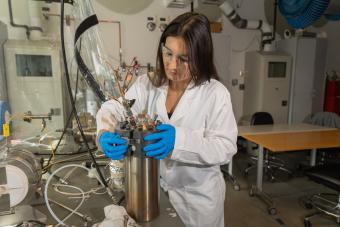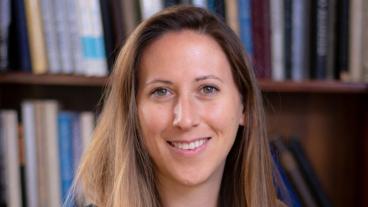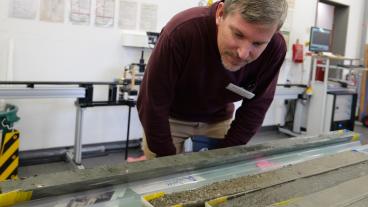Colorado School of Mines awarded $10.5M in fuel cell funding

Sandrine Ricote, research associate professor of mechanical engineering, works with proton-conducting solid oxide electrolysis cells, or P-SOECs, in the lab. Ricote is leading a $3 million U.S. Department of Energy project to demonstrate novel materials, components and designs for high-efficiency ceramic electrolyzers.
Colorado School of Mines recently secured $10.5 million in federal funding reflecting growing support in the U.S. for clean hydrogen and fuel cell technologies and their potential to provide sustainable domestic energy with net zero emissions.
Mines received a total of three awards in recent months: $3 million in Congressionally Directed Spending to advance high-temperature fuel cells and $7.5 million from the U.S. Department of Energy for two hydrogen and fuel-cell related projects: $3 million to develop advanced electrolyzer technologies and components for clean hydrogen production and $4.5 million to develop a combined heat and power system capable of running on low-carbon fuels, including hydrogen.
“Mines is committed to developing and delivering a portfolio of innovative and sustainable energy solutions for practical use,” said Walter G. Copan, Vice President for Research and Technology Transfer at Mines. “Fuel cell and highly efficient electrolyzer technologies are critical to unlocking the potential of clean hydrogen, and these awards will drive and accelerate Mines’ research impact.”
$3M for high-temperature fuel cells
Championed by Colorado Senators Michael Bennet and John Hickenlooper, Mines’ $3 million Congressionally Directed Spending award will provide equipment and infrastructure to advance and mature fuel cell technology for the efficient conversion of ammonia into carbon-free electricity.
“Ammonia is a promising fuel in the hydrogen economy. On the one hand, it is a viable hydrogen carrier that can be used in environmentally friendly combustion processes, thus replacing traditional fossil fuels,” said Bob Kee, professor of mechanical engineering. “Our team is already investigating ammonia combustion to produce carbon-free energy through previous awards.”
“On the other hand, ammonia can be converted directly to electricity using high-temperature fuel cells which produce no polluting emissions,” Kee added. “This new funding will support research infrastructure that enables us to unlock the clean energy potential of ammonia and other alternative fuels through advanced fuel cells.”
To make this technology an economically viable option, greater electrochemical efficiency must be achieved at scale.
The Mines research team is approaching this challenge from a multidisciplinary lens, with researchers bringing experience across cutting-edge fuel-cell research capabilities including new materials development, high-temperature electrochemistry, device design and characterization, ammonia chemistry, and systems integration.
The team is led by Rob Braun, University Distinguished Professor of Mechanical Engineering. In addition to Braun and Kee, the team also includes Colin Wolden, professor of chemical and biological engineering; Ryan O’Hayre, professor of metallurgical and materials engineering; and Raja Rajasegar, assistant professor of mechanical engineering.
“This funding will support several major equipment acquisitions that will enable our team to design, fabricate, and test advanced electrochemical cells and stacks, including those of industry partners,” Braun said. “Rapid energy transition requires scale-up and testing of these devices on emerging fuels and hydrogen carriers at kilowatt-scale in close collaboration with industry to help de-risk technology.”
In addition to adding critical equipment and infrastructure, the funding will also help train the next generation of students in the transition to environmentally friendly, sustainable-energy solutions.
$3M for advanced electrolyzer technologies, components
Mines’ $3 million award to develop advanced electrolyzer technologies and components was part of $750 million in DOE funding from the Office of Energy Efficiency & Renewable Energy, made possible by the Bipartisan Infrastructure Law.
Managed by the Hydrogen and Fuel Cell Technologies Office, the 52 funded projects focus on activities to reduce the cost of clean hydrogen produced via electrolysis and to improve processes and technologies for manufacturing and recycling clean hydrogen systems and materials.
Mines was selected to demonstrate novel materials, components and designs for high-efficiency ceramic electrolyzers that meet performance, lifetime and cost metrics to enable cost reduction and mitigate supply chain risks for clean hydrogen.
“This project will focus on improving performance for proton-conducting solid oxide electrolysis cells, or P-SOECs – an emerging key technology in clean hydrogen production,” said Sandrine Ricote, research associate professor of mechanical engineering and primary investigator for the Mines project team. “Specifically, we are investigating new materials combinations and ways to improve the manufacturing processes for large-area tubular cells, a geometry that can be utilized in P-SOECs to produce greater efficiencies.”
The Mines team developed the proposal with collaborating industry partner HyET NoCarbon USA. In addition to Ricote, the Mines team includes O’Hayre, Kee, Huayang Zhu, research associate professor of mechanical engineering; and Kathleen Hancock, associate professor of humanities, arts, and social sciences.
The community benefits plan for the project will be led by Hancock and seeks to engage a range of stakeholders in labor, government, and communities in southeastern Colorado and community colleges near Mines and the city of Pueblo.
“A key part of the DOE requirement is to engage underserved communities and ethnic minorities,” Hancock said. “We will be working with Colorado State University Pueblo, a regional advocacy organization, and community colleges to ensure diverse populations are educated about and help shape the project.”
Many energy projects begin community outreach after the research is complete. This project, on the other hand, will incorporate socio-technical research into an early-stage technology, allowing insights gained from this engagement to guide subsequent phases of development and implementation.
$4.5M for combined heat and power system run on low carbon fuels
Funded through the Office of Energy Efficiency & Renewable Energy and managed by the Industrial Efficiency and Decarbonization Office, Mines’ $4.5 million award for low-carbon fuels is part of a $171 million DOE investment to reduce industrial emissions towards net-zero.
Mines, in collaboration with Colorado State University and Kohler Power Systems, will develop and demonstrate a flexible combined heat and power (CHP) system capable of running on a range of low-carbon fuels, including pure hydrogen, hydrogen-pipeline-natural-gas blends, and biogas.
The proposed 100-kilowatt system will integrate intermediate-temperature solid-oxide fuel cells with a high-efficiency stationary engine and the necessary equipment to support on-site electricity generation. Using the base system as a building block, it could be scaled up to 10 megawatts for industrial applications.
“This system will operate flexibly in terms of both load-following and fuel type and will reduce carbon dioxide emissions by more than 85 percent,” said Braun, principal investigator for the award. “This technology could be a game-changer for industrial applications, especially because we are targeting flexible grid-services operation where the system can provide excess generation capacity for grid-services.”
As a form of distributed electricity generation, these high-efficiency, low-emissions CHP systems could also be implemented in communities that would benefit from reductions in environmental and health burdens. Jessica Smith, professor of engineering, design, and society, is leading the community benefits plan for the project, which includes assessing the energy equity implications of replacing traditional distributed electricity generation with these systems.
"Our research findings will then be shared with stakeholders from environmental justice organizations, industry, policymakers, and local communities to better understand and strategize how these systems – if successful – could promote energy justice in historically overburdened communities,” Smith said.
In addition to Braun and Smith, the Mines team includes Tyrone Vincent, professor of electrical engineering and Neal Sullivan, professor of mechanical engineering.




